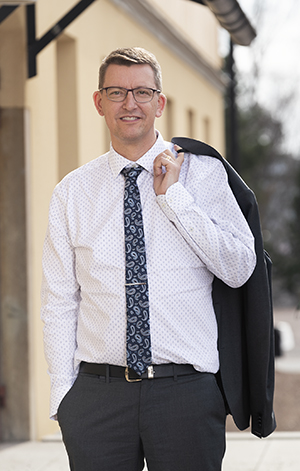The most recent report by the IPCC (Intergovernmental Panel on Climate Change) outlines how great changes are needed if climate change is to be kept in line below 2 degrees Celsius.
 "It's important that we demonstrate that as an educational institution, we take climate change seriously. Since it is we who are educating the citizens and leaders of tomorrow, we are in a position to draw awareness to both challenges and solutions," explains Martin Norsell, Vice-Chancellor at Dalarna University.
"It's important that we demonstrate that as an educational institution, we take climate change seriously. Since it is we who are educating the citizens and leaders of tomorrow, we are in a position to draw awareness to both challenges and solutions," explains Martin Norsell, Vice-Chancellor at Dalarna University.
If the climate goals that Sweden and other countries have set for themselves by way of the Paris Agreement are to be met, then emissions need to be drastically reduced. All sectors within society will be affected, and in such a process of change, universities and other institutions of higher education have a key role, their work being more important than ever.
- There needs to be further research into climate change - how to address it and how to counteract it.
- More citizens and leaders need to be trained to work towards change.
- Solutions need to be developed that can serve to decrease emissions of greenhouse gases and their level in the atmosphere, and people are needed to implement these solutions.
- Knowledge that is acquired must then be shared.
For the university sector as a whole, it is the above four actions that have the greatest chance of making a real difference as we address climate issues. As well, they form part of the climate framework drawn up by the educational institutions.
The Climate Framework
The framework describes how institutions of higher education should position themselves when it comes to climate issues. Those institutions that have aligned themselves with the framework see the climate as an issue of priority. They have agreed to do the following:
- Continue to contribute in such a way that society can meet the set goals by way of education, research and collaboration
- Reduce their own impact on the environment and by 2030 have implemented measures that are in line with the 1.5 degrees Celsius cap
- Set long-term goals for climate work as well as put aside resources so that these goals can be met and reviewed
- Communicate clearly the work they are doing with regards to the climate and spread knowledge at all levels
The climate framework - or Klimatramverket, as it is called in Swedish, relates to a directive describing a number of key ways in which the university sector affects the climate while proposing measures to address these. With this guide as a basis, each institution of higher education will select areas where it can set goals and implement measures according to its own position.
The two universities that took the initiative to draw up the framework are Chalmers and KTH (Royal Institute of Technology).
The Swedish Institutions of Higher Education (universities and university colleges) that have aligned themselves with the framework are the following:
Högskolan Dalarna
Blekinge tekniska högskola
Chalmers tekniska högskola
Enskilda högskolan Stockholm
Ersta Sköndal Bräcke högskola
Försvarshögskolan
Gymnastik- och idrottshögskolan
Handelshögskolan i Stockholm
Högskolan i Borås
Högskolan i Gävle
Högskolan i Halmstad
Högskolan Kristianstad
Högskolan i Skövde
Högskolan Väst
Jönköpings universitet
Karlstads universitet
Karolinska institutet
Konstfack
Kungliga Konsthögskolan
Kungliga Musikhögskolan i Stockholm
Kungliga Tekniska högskolan
Linköpings universitet
Linnéuniversitetet
Luleå tekniska universitet
Lunds universitet
Malmö universitet
Mittuniversitetet
Mälardalens högskola
Newmaninstitutet
Röda korsets högskola
Sofiahemmets högskola
Stockholm School of Economics
Sveriges lantbruksuniversitet
Södertörns högskola
Umeå universitet
Örebro universitet